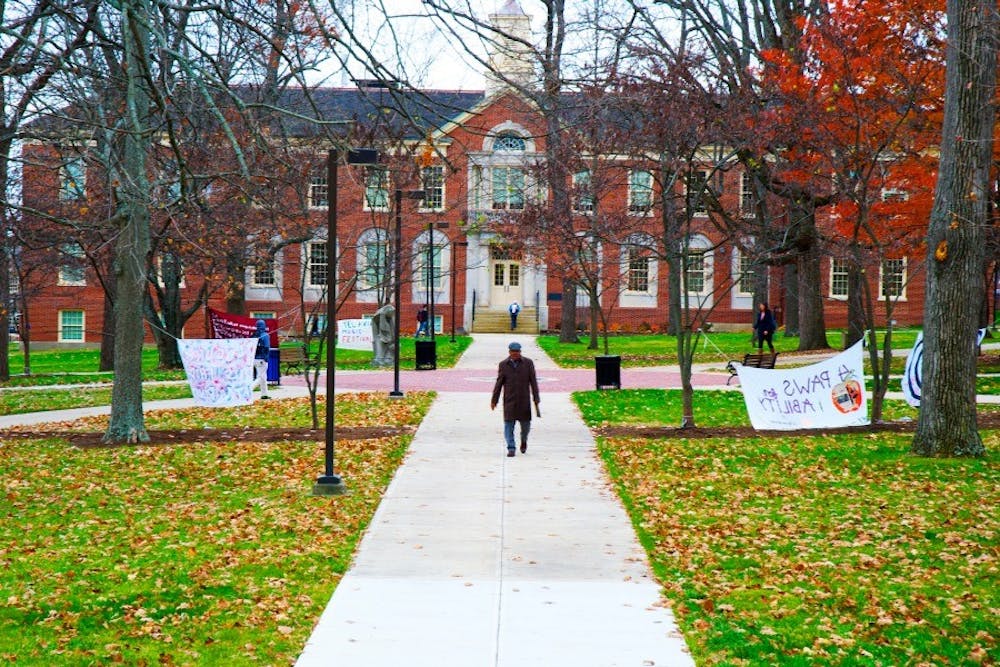By Megan Zahneis, For The Miami Student
John Krafft, a tenured English professor on the Hamilton campus, has been teaching at Miami for 25 years. But, now, he said, he can't recommend the school to any prospective faculty or students.
Krafft's voice has been among the loudest of those protesting the restructuring of Miami's regional campuses - a process that continues to spark controversy after Monday's report to University Senate.
Krafft, along with other regional faculty members, feels that he has not been given a fair chance to voice his concerns.
In support, Miami's chapter of the American Association of University Professors (AAUP) has circulated a petition, calling for a yes/no vote by all regional full-time faculty on what it termed "funnel[ing] into new and amorphous departments." The petition garnered 195 signatures by the time it was submitted to administrators Monday night.
The changes, which aim to offer more bachelor's degrees at the regional campuses, are slated for a Senate vote Nov. 23 and 30.
Krafft proposed a motion on the floor of Monday's meeting, calling for a formal faculty committee-approved voting mechanism. The motion was seconded but did not pass.
Process coordinator John Skillings, who delivered Monday's report to Senate, said Krafft's concerns were valid.
"I think people wanted to have clarity that they would have input in the process, that their voices would be heard," Skillings said. "I tried as best I could [during the meeting] to make it clear that we would provide those opportunities. My sense is that the spirit of what they were asking is the spirit of what we're trying to do."
Provost Phyllis Callahan, while appreciative of the discussion that took place Monday, said she feels the university is doing its due diligence when it comes to seeking faculty input, calling the debate a "circular discussion."
"The motion failed. I think we're going to proceed as we indicated," Callahan said. "The process is completely transparent. We're following our Senate governance. We're being completely visible about everything that's happening."
Cathy Wagner, an English professor on the Oxford campus and AAUP vice president, sees several issues with the administration's handling of the issue, chief among them the timing of Senate's planned voting.
"What's been happening is that these votes on these very, very major transitions at Miami have been happening at the last meeting of the semester, which creates all kinds of problems and makes people feel as if, 'Oh, if we're mad about this, there's nothing we can do about it,'" Wagner said.
The original impetus for reform on the regional campuses came from a 2008 mandate from then-governor Ted Strickland and the Ohio Board of Regents, which stated that regional campuses across the state were in need of more bachelor's programs. Since that time, Miami has commissioned a number of exploratory task forces and committees.
Dissenters feel that the process, despite having been ongoing for a long time, is being brought to a vote unreasonably quickly.
"I can see that there's some reason to clip this along. But it would be a shame if it were at the expense of doing it right," Wagner said.
Callahan and Skillings aren't concerned with the timing of the vote.
"I don't think we're trying to expedite the process," Callahan said. "I think it's been careful, I think it's been well thought out, I think it's been discussed very thoroughly. We are moving to action, that's true. But I don't think it's rushed."
Wagner explained that there have also been communication issues between faculty and administration. The regional English faculty, who were in the process of developing a new English major, were told by administration to halt the process. They were told that the Oxford English department opposed a regional English major, which Wagner disputes.
Theresa Kulbaga, an associate English professor on the Hamilton campus, said the apparent miscommunication caused significant confusion on the regional campuses.
According to Wagner, recently the university has switched from referring to "differentiation" between the regional and main campuses to championing "autonomy" for the regionals.
"You can see the difference between those two terms is really the story," Wagner said.
Krafft had his own take on the change in terminology.
"The buzzword is granting us semi-autonomous status," he said. "I call it semi-orphaned status or semi-stepchild status."
Kulbaga agreed, saying the use of "differentiation" implied a elitism on the administration's part.
"It was like a kind of distancing of the regional campuses from the mission of Miami University, which is elite and serving wealthier students," Kulbaga said."There seems to be an element of snobbery and socioeconomic distaste of the regionals in that language."
Kulbaga and Krafft expressed concern that the proposed changes represent a commonly held stigma against the regional campuses.
"There are a number of higher administration who have that perception and who have, basically, a lot of misinformation about the regionals," Kulbaga said. "Upper administration says things about regionals that seems to spring from a lack of actual knowledge about what we do and who we are."
Kraffit took the sentiment a step further.
"[President Hodge] is trying to wipe the regional campuses off his shoes like so much dog shit," Kraft said. "And that does not bode well for our future."

